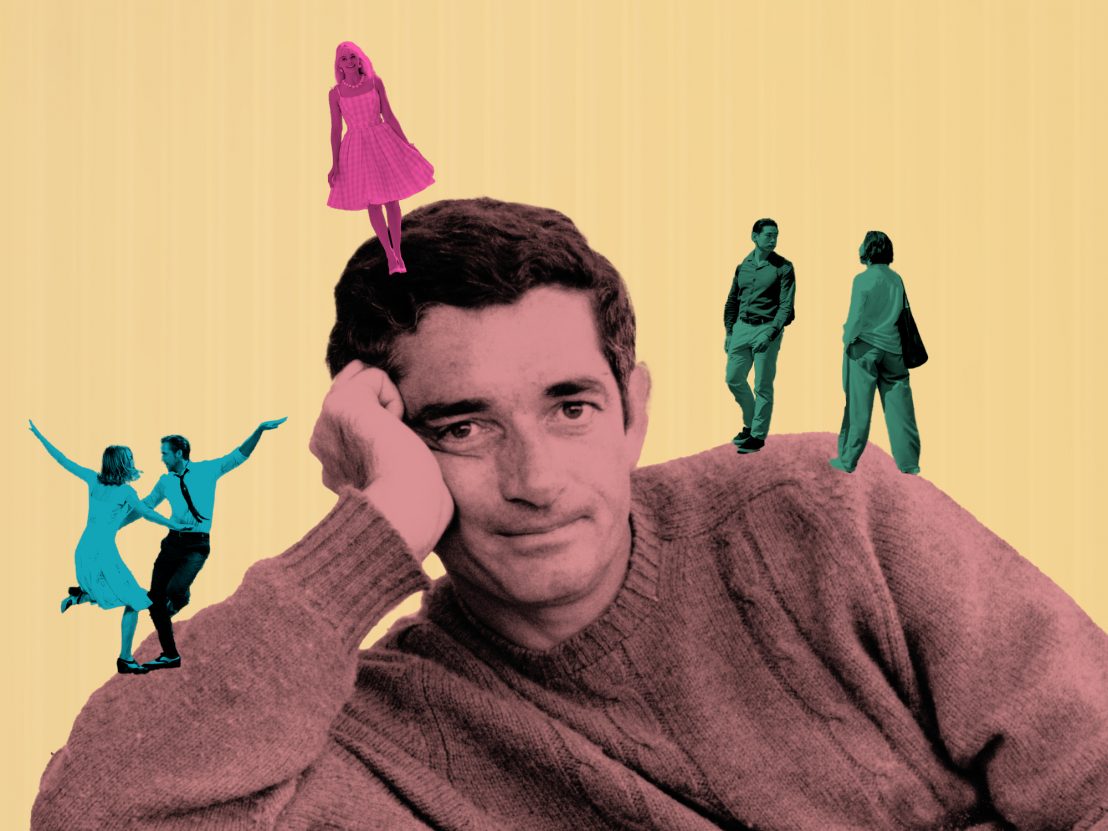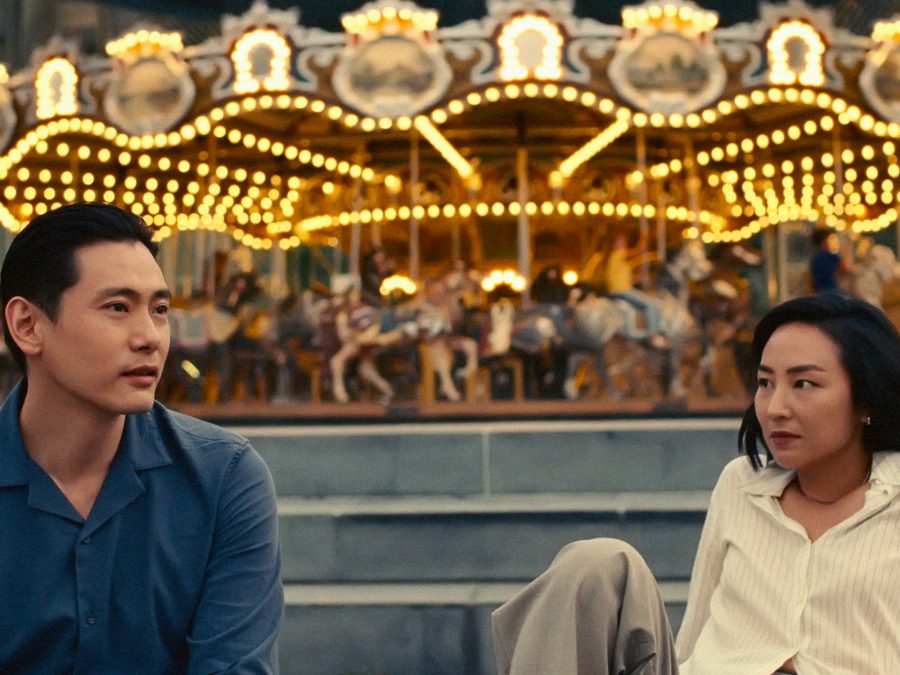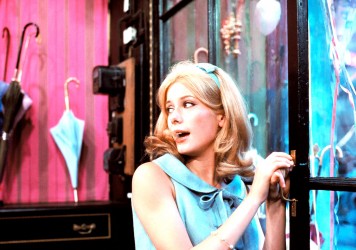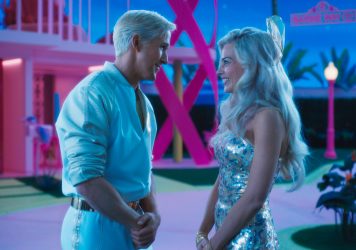
On a 1996 episode of Siskel and Ebert, Roger Ebert’s praise of The Umbrellas of Cherbourg is helmed by the film’s refusal to provide a happy ending: it’s a film about “the way things are”. Watching the film, perhaps you’d be surprised that this is what stood out for Ebert in a film that boasts a timeless look and sound – quite literally en musique, en coleurs, en chanté. So why is it that Ebert picked up on the film’s surprisingly accepting ending – not an anticlimax, but a deliberate lack of romantic perseverance that counteracts the swells of the film’s score and style?
Demy’s musicals – The Umbrellas of Cherbourg (1964), The Young Girls of Rochefort (1967) and Donkey Skin (1970) – all follow loose themes of connection (a relationship that never was, a story of constant narrowly-missed encounters by three pairs of lovers, and a fairytale about love conquering over medieval feudalism respectively), and all put music and cinematic style at the forefront of the narrative. This came at a time when cinema in France was dominated by the Cahiers filmmakers, who were using handheld, indie filmmaking to speak out against what they called ‘tradition of quality’ cinema; a cinema that relied on safe, superfluous narratives in lieu of addressing the reality of the Algerian War, the fault of the Nazi regime, and rife political dissent in general.
In a Film Comment interview between Demy and Graham Petrie in the early 1970s, Petrie prefaces the conversation with a short explanation of this auteur theory that Demy was trying to escape from: “the assumption that, once a satisfactory continuity has been established, the director’s greatness can be taken as proved…the obsession with establishing solid ‘content’ for the film.”
Hotheads like Truffaut and Godard darted between feminist, anti-war and pro-youth sentiment to find this “content”, so that their films stood out as directly reflecting society back at itself – after all, they were pitting themselves against a cinema whose ideology came out in eliding depictions of real life. While this was necessary for post-war France (and even France today), it didn’t approach the audiences as a friend, but rather a naïve student. Jacques Demy’s musicals, on the other hand, with their beauty and grace, treated the audience as a friend.
Demy’s films, having such a grand influence on film culture, have inevitably inspired filmmakers of late. Most notable is maybe Damien Chazelle with 2016’s La La Land. Chazelle himself admits that Umbrellas was a “principal inspiration” for the film, which is easy to pick out not only in the twinned narratives but the way both the tones, colour and rhythms of jazz are used to drive the story. However, La La Land is purely practical inspiration.
While it pulls this off well, elevating Demy’s ability to demonstrate – according to Ginette Billard in Film Quarterly – the “pure fluidity and dash of the medium”, it doesn’t have the additional profundity of being in response to societal desperation, seen through the often dure filmmaking of Jean-Luc Godard, for example. This is where two films from this year come in, which draw similar, formal inspirations from Demy, however, being much more recent, operate in the same realm of escapism as the kaleidoscopic heaven of Demy’s Cherbourg or Rochefort: Greta Gerwig’s Barbie and Celine Song’s Past Lives.

Being two of this year’s defining releases, both films have made headway for the modern female auteur. Barbie, for example, has been endlessly praised for how it leverages the brand, which has made millions off children’s world-building imaginations, to approach pertinent issues of patriarchy and how feminism operates today. Many expected this, which is perhaps the focal point of its famous comparison to Nolan’s Oppenheimer when they shared the same release date.
But perhaps this, much like in Demy’s films, is the prescience of Greta Gerwig’s auteurist style – Petrie may have also said of Gerwig, as he does of Demy, that her films “have suffered more than most” from the auteur prescience; “a critic searching for serious thematic substance can easily find them trivial and lightweight.” When you sit down and actually watch Barbie, you realise that its core themes are a lot more essential, pertaining to motherhood and a rarely-explored-in-the-mainstream look at girlhood in lieu of an all-out derision of the patriarchy.
Indeed, what Petrie is actually arguing is that Demy’s three musicals met the same fate. Umbrellas, for example, sets up the perfect romantic tragedy: two young lovers, torn apart by war, only to be reunited when it is too late. But Demy rejects this: he tells Petrie “I don’t like labels that classify you and file you away as a little ‘romantic’…it’s [actually] a very cruel film and a very realistic one”. This sentiment is very different from Roger Ebert soberingly admitting that the film is about “the way things are”.
So why is it that this tragedy is still being picked up? This is where the film’s style comes in; while the story is ostensibly ‘cruel’ and ‘realistic’, picked up from nouvelle vague tendencies, the over-the-top colours and musical concept come from the theatrics of preceding auteurs like Max Ophüls. It seems Roger Ebert’s approach, the same which could be said about many of Demy’s films, is created by the optimism of the set design and music in spite of the tragic story. The same again can be said for Barbie, though somewhat in the inverse: part of what protects the not-so-feminist story from being wrongly attacked by the men at whose expense the film operates is the colour scheme. Pink has cultural undertones relating to girlhood and thus to innocence, which is here being used to expose the toxicity behind these critical sentiments (who’d be base enough to attack a depiction of inner childhood?).
Another title being dubbed the ‘film of the year’ is Celine Song’s Past Lives. Following two childhood friends who move apart at a young age only to cross paths years later and ponder what might have been, the film is, again, a vague retelling of Umbrellas. Here, we see the other side of Ebert’s comment – coming out in 2023, with culture wars raging on both sides of the Atlantic, Song’s film provides the solace of a world where the only thing that matters is love; where people have the time to stop and ponder what might have been, in lieu of concentrating on what is. Yes, much like Umbrellas, the ending is sad; necessary, but sad.
However, also like Umbrellas, Song’s world-building (the power of technology to bring them together, for example, or the refusal to explore any backstory, allowing her audience to live vicariously through the characters with ease) means that her audience can indulge in being theatrically “sad”, before stepping out of the cinema and back into the real world. Just as Demy’s films and their colours and songs allow relief from the often dure grit of nouvelle vague, Song is providing shelter from the fast-paced modern world (which itself very much resembles a gritty Godard film), allowing us a safe space to be lost in love’s philosophy.
This seems to be the crossroad where both of these films meet in what they lift from Demy. It’s the cinema that Ginette Billard claims “sacrifices banal plots and morals to the sheer delights of mise-en-scène, without any compensating intellectualisation”. This sort of reminder of cinema as cinema, rather than cinema as a reflection of reality, is what allows these films to provide solace for their audiences – the true escapism promised is the masterpiece delivered. Looking at them this way, it’s no surprise that Gerwig and Song were inspired by Jacques Demy, and it will come as no surprise when more directors will be inspired by his genius in years to come.
Published 23 Oct 2023

Director Damien Chazelle has admitted this ’60s classic is a key influence on his forthcoming musical.

Celine Song's feature debut is a tender exploration of multiethnic romance, complimented by nuanced performances from Greta Lee and John Magaro.

Greta Gerwig's behemoth blockbuster is a stranger, more fascinating film than its hyper-corporate marketing would suggest.